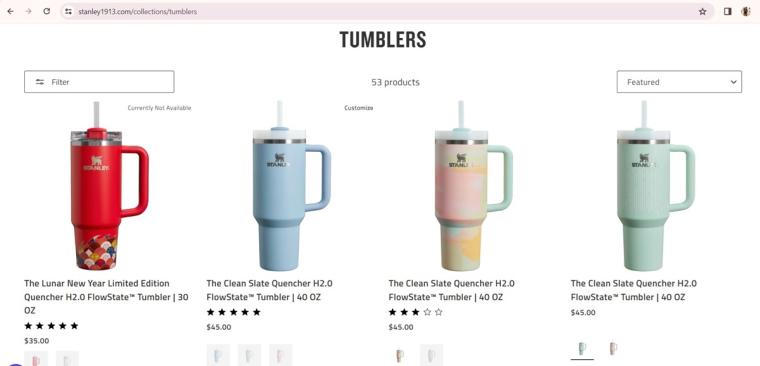
With their sudden emergence as a status symbol, Stanley Cups might be the buzziest drink containers on the market, meaning they are being eyed as premium souvenirs for sports events. In fact, the brand is all over social media, with mugs displayed prominently in the foreground of videos and photos.
Like YETI, a comparable product on the market, the brand’s popularity stems from the fact that it is available in a number of sizes, and the fact that it is able to keep hot drinks hot, and cold drinks cold, far longer than traditional coffee mugs or drinking cup.
But a recent report, claiming the potential for lead poisoning, could be hurting Stanley’s image. The reports first surfaced in January. Some users, according to BBC, posted the results of home tests, claiming the cups contain lead.
However, notes BBC, “It's often unclear from the videos which or how many different brands of at-home lead tests these consumers are using, but to be EPA-certified, home lead tests such as D-Lead must produce an accurate result (when used correctly) 95% of the time. At-home lead tests for drinking water are less reliable.”
 The TODAY Show made things a bit clearer, pointing out, “On the bottom of each quencher made by the beverage container powerhouse is a circular barrier made of stainless steel, which covers a pellet that contains lead, a spokesperson for Stanley explains. The pellet seals the product's vacuum insulation, and it is not accessible unless the stainless steel barrier comes off — which is possible but “rare,” the Stanley spokesperson notes. Rest assured that no lead is present on the surface of any Stanley product that comes into contact with the consumer nor the contents of the product.”
The TODAY Show made things a bit clearer, pointing out, “On the bottom of each quencher made by the beverage container powerhouse is a circular barrier made of stainless steel, which covers a pellet that contains lead, a spokesperson for Stanley explains. The pellet seals the product's vacuum insulation, and it is not accessible unless the stainless steel barrier comes off — which is possible but “rare,” the Stanley spokesperson notes. Rest assured that no lead is present on the surface of any Stanley product that comes into contact with the consumer nor the contents of the product.”
Stanley added that the cup also adheres to stipulations in California Proposition 65, which requires that businesses provide warnings to Californians about heavy metal and chemical exposure.
According to the official website, all Stanley products are “FDA tested and approved, and all contact surfaces are guaranteed to be safe and BPS/BPA-free.”
Despite the fact that the test results are, at best, dubious, social media has never been a platform that lets research get in the way of clickbait content. As a result, a number of posts have surfaced from Stanley customers, with videos of themselves throwing their Stanley cups in the trash.
The New York Times, in response, published an article, headlined, “A Lead Scare Strikes Stanley Tumblers But You Don’t Need to Worry.”
Don’t expect it to help; after all, there has been no qualified research linking synthetic turf fields to long-term health concerns, but the accusations have continued for years.
In other words, says Forbes, Stanley’s mugs might not be a source of lead poisoning but social media and consumer fears might be enough to poison the product’s reputation for a long time to come.

